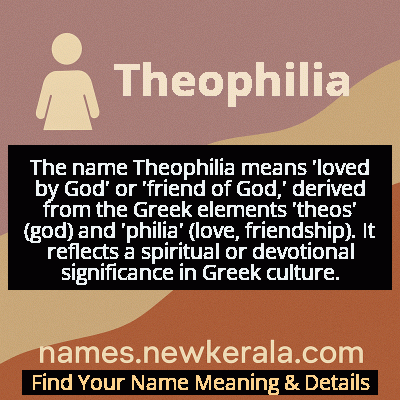Theophilia Name Meaning & Details
Origin, Popularity, Numerology Analysis & Name Meaning of Theophilia
Discover the origin, meaning, and cultural significance of the name THEOPHILIA. Delve into its historical roots and explore the lasting impact it has had on communities and traditions.
Name
Theophilia
Gender
Female
Origin
Greek
Lucky Number
4
Meaning of the Name - Theophilia
The name Theophilia means 'loved by God' or 'friend of God,' derived from the Greek elements 'theos' (god) and 'philia' (love, friendship). It reflects a spiritual or devotional significance in Greek culture.
Theophilia - Complete Numerology Analysis
Your Numerology Number
Based on Pythagorean Numerology System
Ruling Planet
Uranus (Rahu)
Positive Nature
Strong sense of order, loyal, practical, and disciplined.
Negative Traits
Stubborn, overly serious, rigid, and prone to feeling restricted.
Lucky Colours
Blue, gray.
Lucky Days
Saturday.
Lucky Stones
Blue sapphire.
Harmony Numbers
1, 7, 8.
Best Suited Professions
Managers, engineers, accountants, organizers.
What People Like About You
Dependability, discipline, practicality.
Famous People Named Theophilia
Theophilia of Constantinople
Religious Figure
Byzantine abbess and saint known for her piety and founding of religious communities
Theophilia Palmer
Educator
Early American educator who established schools for girls in colonial America
Theophilia Wassilieff
Artist
Russian icon painter known for her religious artworks in Orthodox churches
Theophilia Benigna Zitz
Writer
German poet and novelist during the Romantic period
Name Variations & International Equivalents
Click on blue names to explore their detailed meanings. Gray names with will be available soon.
Cultural & Historical Significance
The name spread throughout Eastern Orthodox communities and later into Western Europe through cultural exchange and religious migration. In medieval times, it was often given to girls born into religious families or those destined for monastic life, reflecting the deep spiritual aspirations of parents hoping for divine protection and blessing for their daughters. The Renaissance period saw a revival of classical Greek names, including Theophilia, among educated elites who appreciated its philosophical depth. Throughout history, the name has maintained its association with spiritual grace and intellectual refinement, making it a timeless choice that bridges classical antiquity with enduring spiritual values.
Extended Personality Analysis
Individuals named Theophilia are often perceived as possessing deep spiritual sensitivity and compassionate natures. They tend to be introspective, thoughtful, and drawn to meaningful connections with others. Their name's meaning 'loved by God' often instills a sense of purpose and self-worth, leading to confident yet humble personalities. Theophilias typically exhibit strong intuition and emotional intelligence, making them excellent listeners and trusted confidantes. They often demonstrate remarkable resilience in facing challenges, drawing strength from their spiritual or philosophical beliefs.
Many Theophilias show artistic or creative tendencies, with a particular appreciation for beauty in various forms—whether in nature, art, or human relationships. Their combination of wisdom and warmth makes them natural caregivers, teachers, or healers in their communities. While they can be private about their deepest beliefs, they radiate a quiet strength that inspires others and creates safe spaces for genuine connection. Theophilias often pursue careers in helping professions, education, or the arts, where they can express their innate compassion and creativity. Their philosophical nature leads them to seek deeper meaning in life's experiences, and they often serve as moral compasses for those around them.
Modern Usage & Popularity
In contemporary times, Theophilia remains a rare but cherished name, experiencing a modest revival among parents seeking meaningful, classical names with spiritual depth. While it doesn't rank in the top 1000 names in most English-speaking countries, it has seen increased usage in academic and artistic circles. The name appeals particularly to families with Greek heritage, classical education backgrounds, or those valuing historical and theological significance. Modern Theophilias often go by nicknames like 'Thea,' 'Philia,' or 'Lia,' making the formal name more accessible in daily use. The name's rarity contributes to its distinctive charm, offering a unique alternative to more common biblical or classical names. Recent years have shown a growing interest in virtue names and names with profound meanings, positioning Theophilia as an elegant choice for parents wanting a name that combines historical weight with spiritual significance while standing out in a crowd of more conventional choices.
Symbolic & Spiritual Meanings
The name Theophilia carries rich symbolic meanings beyond its literal translation. It represents the bridge between human and divine love, symbolizing grace, favor, and spiritual connection. In metaphorical terms, Theophilia embodies the concept of 'agape'—the selfless, unconditional love that transcends ordinary affection. The name suggests being chosen or blessed, carrying connotations of protection and guidance from higher powers. Symbolically, it represents the ideal of living in harmony with divine will while maintaining human compassion. In philosophical contexts, Theophilia can symbolize the pursuit of wisdom through love and devotion, reflecting the Platonic ideal where love leads to higher understanding. The name also carries elements of destiny and purpose, implying that those who bear it have a special role in bringing spiritual light into the world. Its symbolism extends to concepts of sanctuary, healing, and the transformative power of unconditional love in human relationships, making it a name that represents both divine favor and human virtue in perfect balance.

